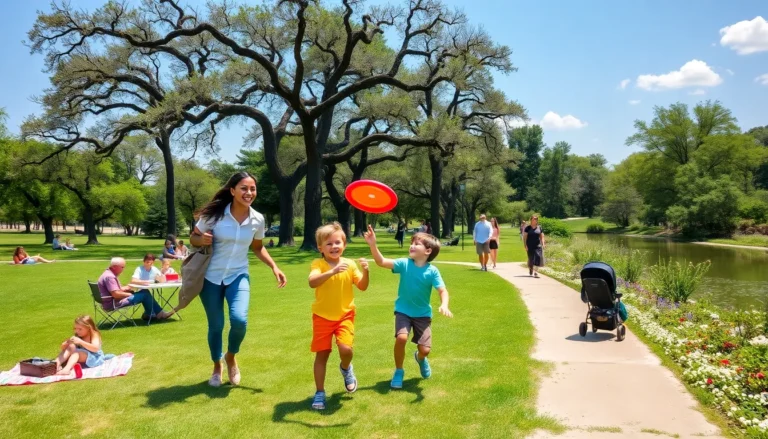In a world where family gatherings often turn into a battle for the remote, it’s time to shake things up with some team-building family games. Imagine the laughter echoing through the house as everyone puts their competitive spirit to the test. These games aren’t just about winning; they’re about bonding, creating memories, and maybe even discovering who really can’t throw a ball.
Forget the usual small talk and awkward silences. With the right games, families can unleash their inner champions while strengthening their connections. Whether it’s a hilarious relay race or a mind-bending trivia challenge, these activities promise to turn any dull afternoon into an unforgettable adventure. So grab your family, roll up those sleeves, and get ready to dive into a world of fun that’ll have everyone talking long after the last game is played.
Table of Contents
ToggleOverview of Team-Building Family Games
Team-building family games enhance relationships during gatherings. These activities foster cooperation, communication, and trust among participants. Engaging in games, such as relay races, promotes teamwork and strategic thinking. Families experience a blend of fun and challenge through friendly competitions.
Traditional games often transform into dynamic interactions, sparking laughter and enjoyment. Trivia challenges stimulate knowledge-sharing while encouraging playful rivalry. Group activities encourage parents and children to engage equally, strengthening bonds through shared experiences.
Popular team-building games include scavenger hunts that promote problem-solving in a relaxed atmosphere. Charades or Pictionary also bring creativity to the forefront, allowing family members to express themselves in entertaining ways. Board games designed for groups reinforce collaboration while developing critical thinking skills.
Outdoor challenges, like obstacle courses, require physical participation and teamwork. Indoor games can involve simple materials yet create significant collaborative efforts. Group cooking sessions can turn into delightful competitions, making meal preparation a bonding experience.
Structured activities encourage diverse age groups to work together. Each game offers unique benefits tailored to family dynamics, focusing on enhancing communication and enjoyment. Ultimately, team-building family games cultivate a sense of belonging and connection, transforming gatherings into memorable experiences.
Benefits of Team-Building Family Games
Engaging in team-building family games offers numerous benefits that enhance relationships and communication. These activities create memorable experiences and encourage a strong family unit.
Strengthening Family Bonds
Team-building games significantly strengthen family bonds. Shared experiences foster emotional connections. Families working together toward a common goal develop trust and understanding. Participation in activities like relay races promotes teamwork, allowing family members to support each other. Laughter during games often leads to shared memories that last a lifetime. Through collaboration, family members can appreciate each other’s strengths and contributions, deepening their relationships.
Enhancing Communication Skills
Communication skills improve through team-building family games. Engaging in group activities encourages open dialogue. Players must express ideas clearly and listen to one another for effective collaboration. Games like trivia and charades, wherein participants often strategize together, stimulate conversation. Overcoming challenges together helps identify and resolve conflicts, instilling patience and empathy. Ultimately, this practice strengthens family interactions beyond gameplay, leading to healthier discussions and connections in daily life.
Types of Team-Building Family Games
Families enjoy various games that enhance bonding and create enjoyable experiences. These games can fall into two main categories: outdoor and indoor activities.
Outdoor Games
Outdoor games promote physical activity while fostering teamwork. Relay races challenge participants to work together, encouraging strategy and coordination. Scavenger hunts spark creativity, requiring family members to collaborate in problem-solving as they search for items. Tug-of-war builds strength and camaraderie, as families unite to compete against one another. Another engaging option, capture the flag, involves strategic planning and teamwork. Families often appreciate the sunshine and fresh air, making outdoor games ideal for bonding and fun.
Indoor Games
Indoor games provide opportunities for family members to connect regardless of external weather conditions. Charades promote laughter and communication, allowing players to express themselves creatively. Trivia challenges test knowledge and spark friendly competition, motivating everyone to participate. Board games encourage strategic thinking and collaboration, making them perfect for family bonding time. Craft activities invite creativity and teamwork as participants work together to complete projects.
These indoor options ensure families remain engaged and entertained while strengthening their connections.
Tips for Organizing Team-Building Family Games
Organizing team-building family games requires careful planning. Creating an inviting environment enhances the experience and encourages participation.
Setting Up the Environment
Designate an area that accommodates all participants comfortably. Space should allow for movement and be free of distractions. Use clear signage to indicate game zones. Incorporate decorations that reflect the spirit of fun, like bright banners and colorful tablecloths. Provide necessary equipment for each game, ensuring it’s easily accessible. Seating arrangements can promote interaction, so consider circles or clusters instead of rows. Accessible facilities, such as restrooms and hydration stations, support families throughout the event.
Encouraging Participation
Involve everyone by offering roles suited to various ages and abilities. Assign game leaders to demonstrate activities, ensuring clarity for all participants. Emphasize the spirit of teamwork, rather than competition alone. Develop small teams that mix ages and skills, fostering inclusion. Share the significance of collaboration and shared victories. Celebrate each achievement, big or small, to maintain enthusiasm. Frequently check in with participants to gauge comfort and engagement, making adjustments as needed.
Conclusion
Embracing team-building family games can transform gatherings into memorable experiences filled with laughter and connection. These activities not only strengthen bonds but also promote essential skills like communication and cooperation. By engaging in both indoor and outdoor games, families can cater to various interests and age groups, ensuring everyone feels included.
The joy of friendly competition and shared achievements fosters a sense of belonging that lasts beyond the event. With thoughtful planning and a focus on participation, families can create an inviting atmosphere that encourages connection and interaction. Ultimately, these games serve as a powerful tool for nurturing relationships and creating cherished memories that families will treasure for years to come.









